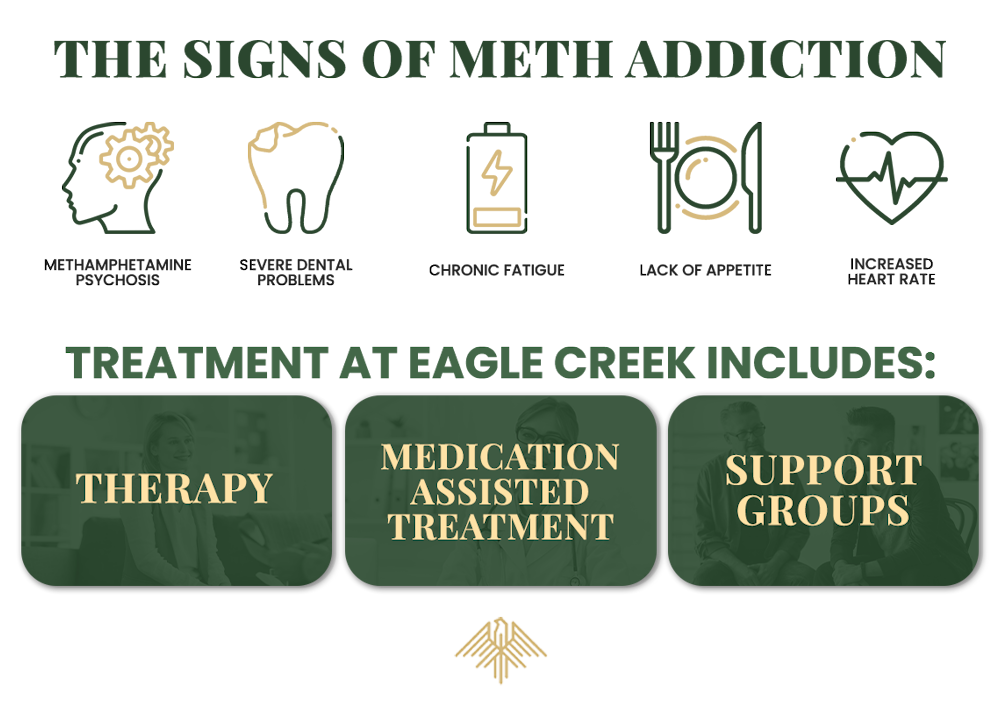Meth Addiction Treatment Center
Methamphetamine, or meth, is a potent and highly addictive stimulant. Its addictive properties lead to many cases of substance abuse and this drug can have harmful effects, especially for chronic methamphetamine users.
According to the National Institute on Drug Abuse and the Centers for Disease Control (CDC), thousands of people overdose on methamphetamine a year. Learning about meth addiction and the effects of drug misuse can help individuals identify if they or a loved one has a substance use disorder and be able to find access to quality treatment.
If you or a loved one struggles with drug abuse, Eagle Creek Ranch Recovery’s meth addiction treatment center can help you begin your journey to an alcohol and drug-free life. We provide a variety of substance abuse treatment programs and individualized care at our gorgeous ranch in Nampa, Idaho.
Methamphetamine, commonly known as meth, is a powerful stimulant drug that exerts its effects on the central nervous system. Although there have been rare instances where it has been prescribed for severe obesity and attention-deficit hyperactivity disorder (ADHD), its primary use is as a recreational or street drug, lacking any legitimate medical purpose.
Recreationally, two main forms of meth are commonly used: meth and crystal meth. Meth typically exists as an odorless crystalline powder, while crystal meth is transparent or blue and takes on a crystallized structure, hence its name. Smoking is the traditional method of ingestion for crystal meth users, while meth can be consumed through smoking, injecting, or snorting. Street names for Meth include:
- Ice
- Glass
- Speed
- Crank
- Crystal
- Chalk
- Tweak
Meth is typically found in an odorless crystalline powder form. This may be referred to as speed in this form. It is typically ingested via smoking, injecting, or snorting.
Crystal meth is clear or blue and comes in a crystalized form, thus the name crystal meth. Crystal meth is traditionally ingested by smoking it.
Being a central nervous system stimulant, meth induces intense feelings of euphoria by triggering a surge of dopamine in the brain. This pleasurable sensation creates a strong craving for more, leading to a state of dependence and addiction with prolonged use over time. To break the cycle of long-term meth abuse, going to a meth addiction treatment center for professional help is the best course of action.
Contact Eagle Creek Ranch
Recovery Today!
Why Wait? Find The Help You Need By Reaching Out To Us Today! Our Admissions Team Is Standing By.
How Does Meth Affect the Brain and Body?
Methamphetamine use has many negative consequences. When someone ingests meth by smoking it or injecting it, they immediately feel a “rush” of dopamine to the brain. When someone snorts meth, they still get that euphoric sensation from the additional dopamine but not the “rush”. While the initial rush lasts up to 30 minutes, the ensuing high that the person experiences can last for hours and can even last as long as a day.
This occurs because when someone takes meth it prevents the brain and the body from regulating their dopamine levels. When someone takes meth it keeps the body and the brain from recycling dopamine. This causes excessive dopamine levels to build up with nowhere to go. Once this happens, the brain thinks it always needs that amount of dopamine to experience pleasure or euphoria.
The side effects of methamphetamine are so strong that addicts do not want to quit using the drug. For this reason, having a support system is crucial. Family members and close friends must help their loved one seek treatment. Without a support system, many addicts will never seek help and may face fatal consequences. During inpatient rehab, you live at the facility for the duration of your treatment. Inpatient treatment comes with additional services that aren’t made available to those in outpatient treatment including 24/7 monitoring and access to additional medical care and nutrition. Short or long-term methamphetamine abuse can lead to adverse health effects such as:
- More energy
- High body temperature
- Fast heart rate
- Faster breathing
- Not feeling hungry
- Anxiety, confusion
- Itchy skin, causing sores from scratching
- Extreme weight loss
- Rotting teeth
- Irregular heartbeat
- Elation
- Alertness
- Hyperactivity
- Paranoia
- Confusion
- Irritability
- Insomnia
- Tremors
Meth addiction can also create health problems such as cardiovascular disease, high blood pressure, dental problems, and kidney failure. Methamphetamine abusers may also develop mental disorders as a result of continued drug use.
Meth is A Highly Addictive Drug

Meth addiction is characterized by a compulsive urge to use methamphetamine. Since meth is a Central Nervous System (CNS) stimulant, it produces intense feelings of euphoria. Once the brain experiences this dopamine rush, it wants more and more of it, leading to dependence and drug abuse. Methamphetamine increases dopamine levels in the brain, altering brain function and prompting repeated drug-seeking behavior. It also prevents the dopamine from being recycled, leading to elevated dopamine levels.
Once the brain starts to experience these increased dopamine levels, it realizes that it needs more and more dopamine to experience things such as pleasure or euphoria. The brain might also acknowledge that it enjoys some of the other effects associated with meth use such as alertness and feeling more energetic. This leads to the brain-rewarding behaviors of meth abuse. Once that happens, the brain will alert the body that it wants more and more meth to continue to reach its desired effects. At that point, the brain has become dependent and tolerant of meth which can ultimately lead to addiction.
Attempting to self-detox is not recommended, as an attempt to do so can exacerbate withdrawal symptoms, or worse, cause a person to overdose. Leaving drug addiction untreated, has resulted in major health consequences, coma, and even death. That’s why receiving help from a professional meth treatment specialist is highly recommended. Our medical professionals will review each of our client’s cases and discuss the best drug abuse recovery options for their needs.
At Eagle Creek Ranch Recovery in Nampa, Idaho, the addiction specialists at our meth addiction treatment center, will help you or a loved one learn to manage your symptoms and recover from drug abuse.
Signs and Symptoms of Methamphetamine Use Disorder
Identifying the signs and symptoms of meth addiction can be key to getting either yourself or someone you know the treatment that they need before it is too late. Someone suffering from meth addiction can experience a variety of both physical and psychological symptoms. They will also experience withdrawal symptoms when they stop taking the substance and it leaves their system.
Symptoms and side effects of meth abuse include but are not limited to:
- Methamphetamine psychosis
- Increased sensitivity to noise
- Euphoria
- Lack of appetite
- Chronic fatigue
- Severe depression
- Tremors or twitching
- Nervous activity
- Increased heart rate
- Mood disturbances
- Disruption in body temperature including hyperthermia
- Severe dental problems such as tooth decay (also known as “Meth mouth”)
- Increased risk of HIV, AIDS, or Hepatitis B
- Risky behavior including unprotected sex and thrill chasing
- Dilated pupils
- Chest pain
- Itching
- Pumps or marks around the injection site
- Hallucinations
- Cravings
Meth Withdrawl Symptoms
When meth or any substance of abuse begins to leave the system, the body will begin to experience withdrawal symptoms. These withdrawal symptoms can be severe and even dangerous, which is why it is always recommended that the withdrawal and detox process be done under the care and supervision of trained medical professionals. Common withdrawal symptoms associated with methamphetamine misuse include:
- Dehydration
- Chills
- Fatigue
- Anxiety
- Cravings
- Loss of ability to feel pleasure
- Lack of clarity mentally
- Depression
- Irregular sleep patterns
- Weight gain
- Irritability
- Intense mood swings
- Psychosis
If you or someone you know is exhibiting signs of meth addiction, it is critical to seek professional treatment. Eagle Creek Recovery provides treatment both for primary addiction as well as, mental health treatment for men in Nampa and Boise, ID. A meth addiction treatment center will offer a path to recovery.

Risk Factors Of Meth Addiction
There are a few factors that can largely influence the development of a meth addiction including family history and environmental triggers. Genetics plays a role in many substance use disorders. If meth addiction is present in your family history, then it’s more likely that you may develop a methamphetamine abuse problem.
The environment an individual grows up and lives in can also lead to methamphetamine addiction. Access to substances, lack of supervision, stressful environments, or abusive environments can all influence a person negatively.
Meth Addiction Treatment
A meth addiction treatment center helps individuals break the cycle of drug abuse and achieve sober living. Drug addiction requires a comprehensive treatment approach because most people who have a meth addiction do not enter rehab willingly.
Addiction treatment isn’t a “one-size-fits-all” program. Each person handles treatment differently and not every treatment method works the same for everyone. That’s why there are a variety of other treatment approaches and options available at our meth addiction rehab for those suffering from methamphetamine abuse including therapy and medication-assisted treatment (MAT).
Depending on a person’s level of addiction, unique needs, and other factors, they will be admitted into either a residential treatment program or outpatient rehab. Inpatient detox, is typically for more severe cases, while outpatient is for people with less severe cases, who can live more independently at home or in a sober living home while still attending treatment and recovery meetings. Eagle Creek’s meth addiction treatment center offers outpatient levels of care, including holistic therapy, and dual diagnosis treatment.
The first step in the recovery process is detoxification. Medical detox is the act of cleansing the body of addictive substances. Although it may sound like a simple step, it is one of the most painful parts of recovery. The temptation to use methamphetamine is so strong that people will experience severe withdrawal symptoms. Some of these symptoms may include:
- Intense cravings for meth
- Nausea and vomiting
- Extreme fatigue
- Anxiety
- Depression
- Nightmares
- Insomnia
- Paranoia
The meth withdrawal and detox process can be broken down into 3 main stages:
- Crashing
- Craving
- Treatment
Crashing occurs during the first 48 hours after you stop meth use. During this time, you will begin to experience intense withdrawal symptoms such as:
- Fatigue
- Stomach issues
- Hallucinations
- Headaches
- Muscle Spasms
- Irritability
- Sweating
- Nausea
- Cramping
- Lack of energy
- A decline in cognitive function
- Depression
- Anxiety
The “crashing” stage can last anywhere from a few days to a few weeks depending on the severity of the meth addiction and how your body reacts to the withdrawal process. On average these symptoms tend to last anywhere from 10 days to 3 weeks.
Once you have completed the crashing phase and have finished going through the withdrawal process, the next phase is the “cravings” stage. Once you hit this stage, all the meth has been cleared out of your system and the physical side effects will have subsided. However, you will still experience some of the psychological side effects associated with withdrawal, including cravings. These cravings can continue for several months and, if not addressed properly, can lead to an increased risk of relapse.
With the help of a meth treatment program, specialists can alleviate withdrawal symptoms through medication-assisted treatment (MAT) utilizing a combination of medication management and addiction therapy services to lessen symptoms, stop cravings, and prepare someone for treatment.
Although this first step of meth detox is difficult, it is essential for recovery. It’s important to note, that the detox process isn’t a replacement for addiction treatment, as relapse is very common during the early stages of recovery and after treatment. A program is necessary in conjunction with detox to maximize the chances for long-term recovery.
While there is no medication specifically approved for treating meth dependency and addiction, medications might be administered to help address some of the side effects and symptoms associated with withdrawal and detox, particularly early on in the detox process.
Benzodiazepines might be prescribed to someone who is experiencing extreme withdrawal symptoms to help make them more comfortable. Fluoxetine might also be prescribed to help alleviate some of the psychological symptoms associated with withdrawal and detox such as anxiety or panic attacks.
Behavioral therapy, specifically psychotherapy, is a major component of addiction treatment programs, including treatment for meth abuse. Popular forms of counseling are cognitive-behavioral therapy (CBT) and dialectical behavior therapy (DBT). Therapy targets the triggers of substance use.
Therapy such as CBT for substance abuse helps peel back the metaphorical layers and helps both the person in therapy and the therapist better understand what caused the meth addiction in the first place. Once that happens, the therapist can then work with the person in therapy and teach them better and healthier ways to deal with these triggers and cravings going forward.
Eagle Creek provides addiction therapy services that utilize these behavioral therapies in individual and group therapy settings. During these therapy sessions, professional therapists work with clients to replace bad habits with good ones. In addition to CBT, at Eagle Creek Ranch Recovery’s meth addiction rehab, we also offer other therapy services including:
After receiving treatment in a rehabilitation center, it’s beneficial for recovery to join a support group. Support groups may include group counseling and access to other relapse prevention resources. In a support group, individuals who are in recovery share their experiences with substance abuse and can offer advice and emotional support to anyone who is struggling with their recovery.
Group support is also a major component of treatment within a rehab center. Group counseling helps work on communication skills and improve interpersonal relationships. In a group setting, individuals are also encouraged to practice coping skills for managing intense cravings, avoiding negative behaviors, and reducing the risk of relapse.
Residential treatment for meth addiction typically lasts around 30 to 90 days, depending on the condition of the client. During this time, clients will engage in various forms of individual and group therapy. Residential treatment allows clients to be in the care of physicians at all times. This form of treatment is recommended for clients early in the recovery process that need extra attention.
Clients who are unable to control their addictive urges may benefit from the support of professional healthcare workers who can administer treatment and therapy. Being at the rehab location eliminates further drug use and facilitates medical detox.
Outpatient treatment is a less intensive care program that typically follows residential treatment. Clients who engage in outpatient treatment for meth addiction rehab live at home or in a sober living facility. Depending on the level of care necessary for a client, the intensity of the program may vary. We offer several levels of care in our outpatient program:
- Outpatient Program: Our outpatient treatment program for men provides care, including therapy, medication, and case management, while men live at their homes or one of our sober living residences.
- Partial Hospitalization Program: Our partial hospitalization program (PHP) is a hybrid of inpatient and outpatient treatment. Clients enrolled in a PHP will spend more time and have more sessions at the treatment facility than in a typical outpatient program.
- Intensive Outpatient Program: In our IOP drug treatment program, men receive more intensive therapy and treatment sessions. IOP includes treatments 5 to 7 days a week.
We understand that not every treatment option works for every person or every type of addiction. That’s why we will work with you to create a custom treatment plan designed to fit you and your needs.
Eagle Creek highly advises against self-detoxing. It’s dangerous and can result in deadly consequences if not done in a safe and professional environment. Our meth addiction treatment center performs the detox process under constant supervision and monitoring. Cravings and withdrawal symptoms will be subdued and managed accordingly.
Contact Eagle Creek’s Meth Addiction Treatment Center in Idaho
Eagle Creek Recovery in Nampa and Boise, ID offers top-of-the-line care for men seeking help for meth addiction. Our highly trained staff works with clients to develop a specific, goal-oriented treatment plan that leads to sober living. Our meth addiction treatment center offers a variety of treatment programs designed to give our patients the tools necessary to beat meth addiction.
Freedom from addiction may seem unachievable, but we know that is not the case. Experience the benefits of recovery at our men’s only rehab center. For more information about how we treat meth addiction, and the services we offer, reach out to our team.
If you or someone you know is suffering from meth addiction or another stimulant use disorder, it’s important to remember that help is available. We are ready to help you get started on the road to recovery. If you are interested in taking control of your life once again, feel free to contact us today!


Clinical Director
Kendall Maloof is the clinical director at Eagle Creek Ranch Recovery. She is a licensed marriage and family therapist and has held multiple leadership roles before settling here at Eagle Creek. Kendall received her master’s degree in marriage and family therapy from the Chicago School of Professional Psychology in 2016. Her career in mental and behavioral health began in 2014 when she took up internships in both the nonprofit and for profit sectors. She interned at multiple reputable companies, such as The Living Success Center and 449 Recovery in California.
In 2019, Kendall became the clinical director of Sunsets Recovery for Woman, a dual diagnosis program in southern California. Kendall is a natural leader. She has an incredible ability to problem solve and stay calm in any situation. Kendall never fails to show up when she is needed, and her calm demeanor makes her team and clients feel at ease. Eagle Creek Ranch Recovery is proud to have Kendall as our clinical director.



